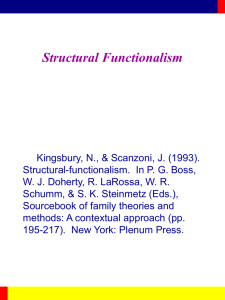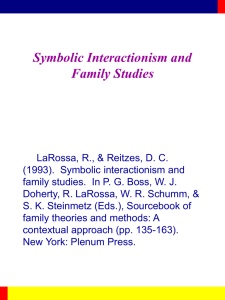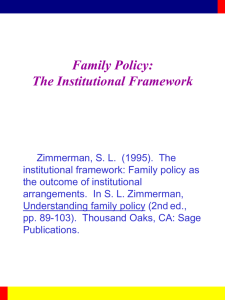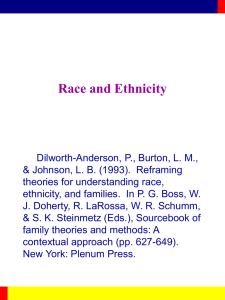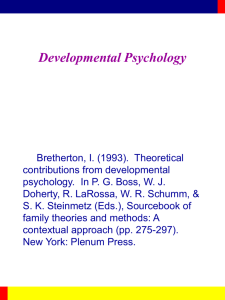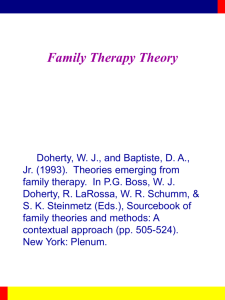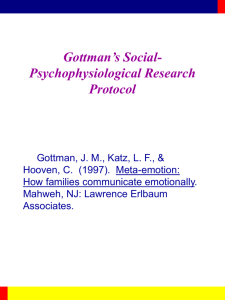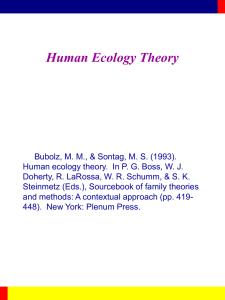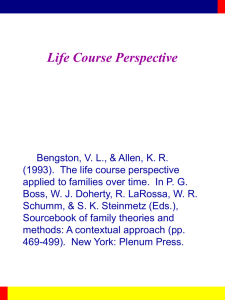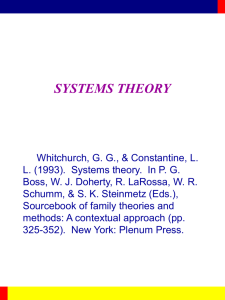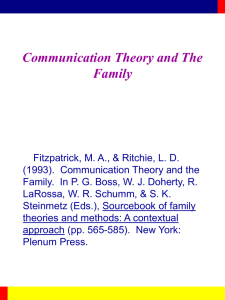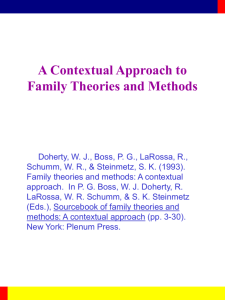Social Conflict Theory
advertisement
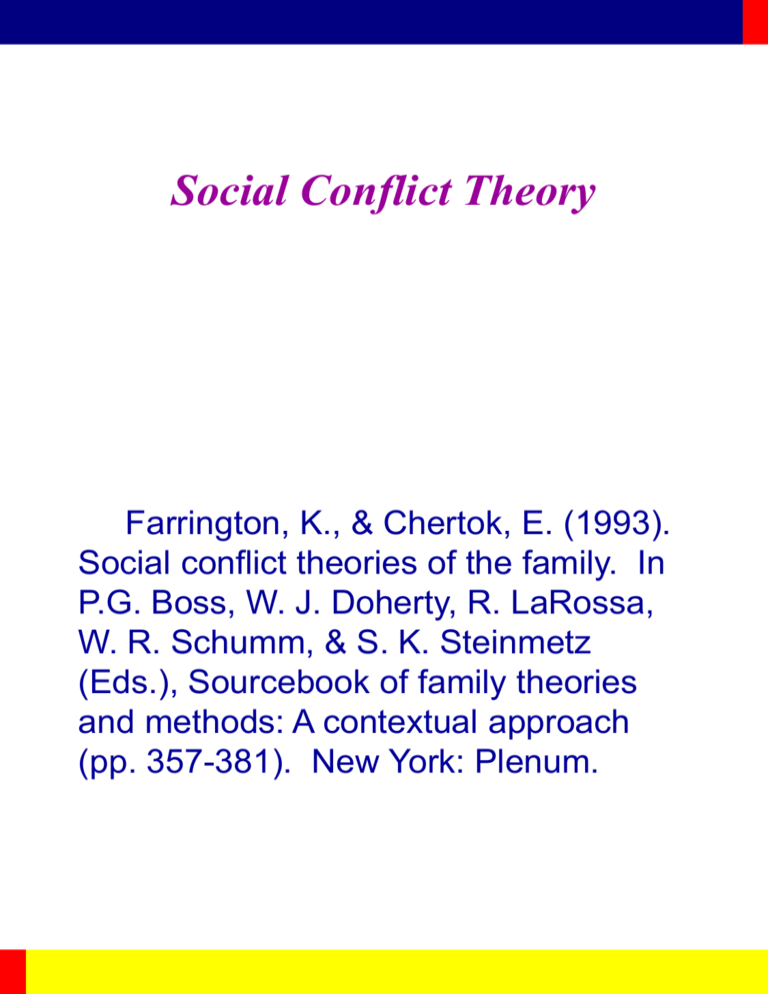
Social Conflict Theory Farrington, K., & Chertok, E. (1993). Social conflict theories of the family. In P.G. Boss, W. J. Doherty, R. LaRossa, W. R. Schumm, & S. K. Steinmetz (Eds.), Sourcebook of family theories and methods: A contextual approach (pp. 357-381). New York: Plenum. Historical Origins: Tendency toward conflict is a basic element of human nature (Machiavelli, 1531/1948, 1532/1948; and Hobbes, 1651/1947). Competition for scare resources: Conflict and struggle promote human social existence by ensuring that the strongest of a species survive (Darwin, 1859/1958; Malthus, 1789/1894). Herbert Spencer (1898) suggested that conflict is a natural process which contributes to social evolution. William Graham Sumner (1883) proposed that competition for survival caused positive social advancement. Dr. Ronald J. Werner-Wilson Historical Origins (cont.) Marxian Theory: conflict is a basic structural condition of society. Conflict is an inherent part of human relations. Human existence is contradictory. Human thought and action occurs through a dialectic process: thesis, antithesis, and synthesis. Class: A material view of people: human actors produce themselves through work. Two fundamental groups: workers and owners. Owners exploit workers. Political power is the result of economic power. Political order: legal, educational, and family systems are designed to benefit owners, resulting in an "economic determinism." Engels, Marx's regular collaborator, applied social conflict to the family: the positions of men and women are analogous to the positions of owners and workers, respectively. Dr. Ronald J. Werner-Wilson Historical Origins (cont.) Freud’s Psychoanalytic Theory and Conflict: Self-interest is basic to human nature, but is managed by conscience. There are aggressive unconscious forces which seek expression. The Importance of Power: Power: the ability to carry out own will despite resistance. It is related to social conflict and social order. Power is a critical element of social existence. People, as a result of their position, exert power over others. Power is institutionalized and legitimated: this produces social order. Conflict is an integrative social force: social reality is dualistic, including forces that promote social order and social conflict (Simmel, 1904, 1908/1955). Conflict can unify people against a common enemy. Conflict can be a divisive force. Dr. Ronald J. Werner-Wilson Social Conflict Theory and the Field of Family Studies Conflict Theory Was Missing From Mainstream Research: popular text books did not reference conflict theory; most research on conflict examined role conflict, an individual phenomenon, rather than interpersonal conflict. Dr. Ronald J. Werner-Wilson Obstacles to Integration of Social Conflict Theory into Family Studies Zeitgeist: "equilibrium-based, maledominated, politically conservative, structural-functionalist interpretation of social reality." As a result, conflict was given a negative connotation. Family conflict was considered deviant. Intellectual obstacles: Limited systematic attempt to link family dynamics to social structure. Family dynamics were emphasized as reciprocal or functional. Social conflict theory emerged as the field, like others, was moving toward positivism. A conflict approach does not lend itself very well to positivism. Larger social context: the family is considered a sacred institution. As a result, support for research on conflict in the family has been discouraged. Dr. Ronald J. Werner-Wilson Emergence of a Social Conflict Theory of the Family Sprey (1969) is credited with introducing a conflict approach to family studies. Sprey (1969) suggested that the family was a "system in conflict." Basic assumptions: Conflict is typical. Harmony is a problematic. Research should examine the ability of family members to deal with conflict. Various texts and monographs utilized a conflict approach, including LaRossa (1977). Feminist scholarship used a conflict approach to analyze general themes of gender relationships as well as the influence of the family. Scholarship examined the role of the family in maintaining inequalities in male-female relationships. Dr. Ronald J. Werner-Wilson Emergence of a Social Conflict Theory of the Family (cont.) A conflict approach to the family seemed to develop within the mainstream of family studies. The 1970s featured a variety of substantive topics: husband-wife conflict; intrafamily communication patterns; conflict between parents and children; relationships between siblings; family disputes over inheritance; intrafamily conflict management; marital therapy and counseling; force, including threats, in the family; structural barriers faced by women in higher education. Dr. Ronald J. Werner-Wilson A Social Conflict Perspective of the Family Fundamental assumption, shared with general conflict theory: conflict is a basic element of human social life. Basic reason for conflict: individuals are motivated to act in accordance with their own interests. People pursue needs, values, goals, and resources that they define as important or desirable. Two possibilities that can lead to conflict: Different individuals or groups may want different things. This is applicable to the family (e.g., children argue about use of television, parents are children disagree about issues). Different individuals or groups want the same thing, but there is a limited supply of the commodity. Larossa's (1977) work on parenting, for example, suggests that men and women compete for time. Polatnick (1984) suggests that men don't do housework because it isn't profitable. Dr. Ronald J. Werner-Wilson A Social Conflict Perspective of the Family (cont.) Power: Some family members are better able to pursue their particular self-interests. Most power is "legitimate" because it is sanctioned by social norms. Power is a source of conflict. Power structure obscures or minimizes the expression of actual conflict by family members. Stratification: Definition: distribute (or withhold) resources in an unequal fashion. Age and gender stratification have been used in most human societies. Stratification organizes and justifies behavior. Creates and perpetuates structural inequalities, providing differential opportunity structures. Dr. Ronald J. Werner-Wilson A Social Conflict Perspective (cont.) Farrington and Keith suggest that the most "satisfying versions of family conflict theory [are] explicitly macrostructural in nature" (1993, p. 370). This approach suggests that structural variations of the family (e.g., families in poverty; ethnicity of family) are important; families contribute to the maintenance of the existence of the social order via socialization of children and power structures (e.g., division of household labor). Families are paradoxical, containing structural mechanisms which regulate power, and they are characterized by processes which operate to intensify conflicts. Although conflict is present, social order is maintained. Benefits of conflict, if it is limited in amount, intensity, and manner of expression: Source of personal growth (e.g., fulcrum for change). Effective method for dealing with underlying or potential family problems. Dr. Ronald J. Werner-Wilson Present Status and Likely Future Conflict theory has peaked. Why? Conflict theory has only been employed by a small minority of family theorists and researchers. According to Klein and Schvaneveldt (1977), contemporary theorists do not see the social conflict approach as having much impact on the field. There has not been a unified, coherent conflict theory of the family. Instead there has been a "rather eclectic conceptual framework" (Farrington & Keith, 1983, p. 374). Conflict theory survives, in modified form, in critical theory and feminist theory. Dr. Ronald J. Werner-Wilson
